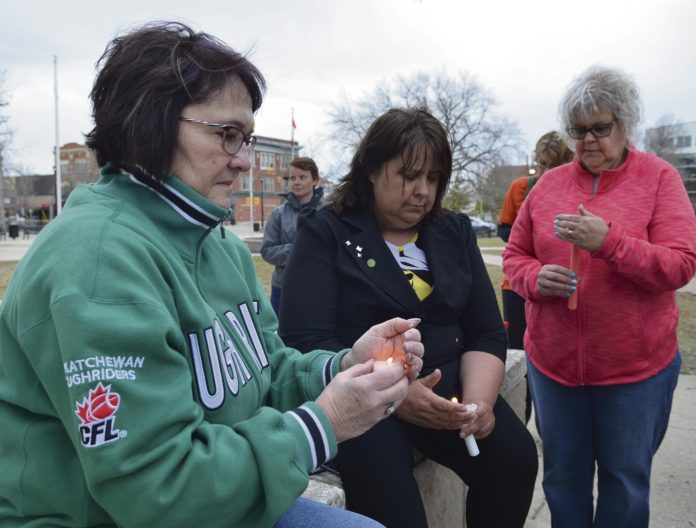
Vigil held Wendesday night to remember the 128 people missing from Saskatchewan
Nine chairs sat empty in front of City Hall Wednesday night, lined up in a lonesome row as a small group of observers looked on, holding lit candles, and observed a moment of silence.
The nine chairs were symbolic of the nine missing persons cases Prince Albert Police have open right now. Those nine cases are some of the 128 open cases long-term in the province, and the more than 100,000 people who are reported missing across Canada every year. The nine names missing in Prince Albert were read as a real reminder of the families who still suffer when someone is missing.
“There are always going to be positive outcomes and there are always going to be negative outcomes,” Prince Albert North Search and Rescue (PANSAR) representative Chrissy Halliday.
“One of the most positive recent outcomes that I’ sure is on everyone’s mind is Jim Mumm from Shellbrook. He went missing last week and was found within 48 hours. He is alive and well and has been returned to his family.
“Then there are the negatives, the still missing. They are the people we need to remember.”
Halliday helped put the vigil together. It was held in honour of missing persons week, held in Saskatchewan from April 29 to May 5. The vigil was attended by representatives from PANSAR, the police, the fire department, victim services and concerned community members.
“Anyone can go missing, regardless of gender, age, ethnicity or educational background,” Halliday said.
“People go missing for a variety of reasons, including mental illness, miscommunication, misadventure, domestic violence and, of course, victims of crime. These are not the only reasons but they are a few.”
For some families, not knowing what has happened to their loved ones can be the hardest part. Mikayla Worth sees that on a regular basis. She’s the missing persons liaison with Prince Albert Victim Services.
“My specialty is dealing with ambiguous loss,” she said.
‘That’s how you’re feeling not knowing what’s going on when a loved one is missing, and how to cope with dealing with the unknown. We provide the services to help families in any way, shape or form.”
Victim Services and the Prince Albert police were also hoping to clear up misconceptions about missing persons, such as the requirement that you have to wait 24 hours (you don’t), that only family can report someone missing (others can too) and that a cold case means a closed case.
“When someone goes missing or is missing for a long time, the family, the police service and the community are faced with a lot of unknowns,” said Staff Sgt. Dave Schluff.
“That is very difficult and very trying for family. We want to be compassionate and empathetic to families of missing people, and we want to never give up. If somebody is missing, that file will never close. We’re always searching and looking for answers. If a person is missing, that file will remain open forever.”
While the police are often the first point of contact for missing persons investigations, Halliday and others spoke about what else happens and who else gets involved to prevent people from going missing and to respond when somebody does.
If police think someone can be found relatively quickly with assistance, ground search and rescue groups — like PANSAR — are called in.
“We’re ground search and rescue. We go through the bush, we walk city streets, there’s a variety of ways we will come and find you,” Halliday said.
The group is made up of what Halliday calls “professional volunteers.” None of them are paid, but they’re all trained up to a set of standards. They’re also trained in preventative search and rescue, where they train people, such as children, what to do in case they get lost or go missing.
Other groups, such as the Saskatchewan and the Prince Albert Council of Women, work to eliminate risk factors, such as violence against women.
“We have been urging government for many years now to address the many aspects of violence against women,” said Randi Arnot, the president of the Saskatchewan Council of Women.
‘We walk humbly beside the many people who are on a journey of grieving, and we are so very thankful of those of you on your own difficulty journey as people willing to work on the frontlines. E thank you and stand committed with you to continue to work for social change.”

